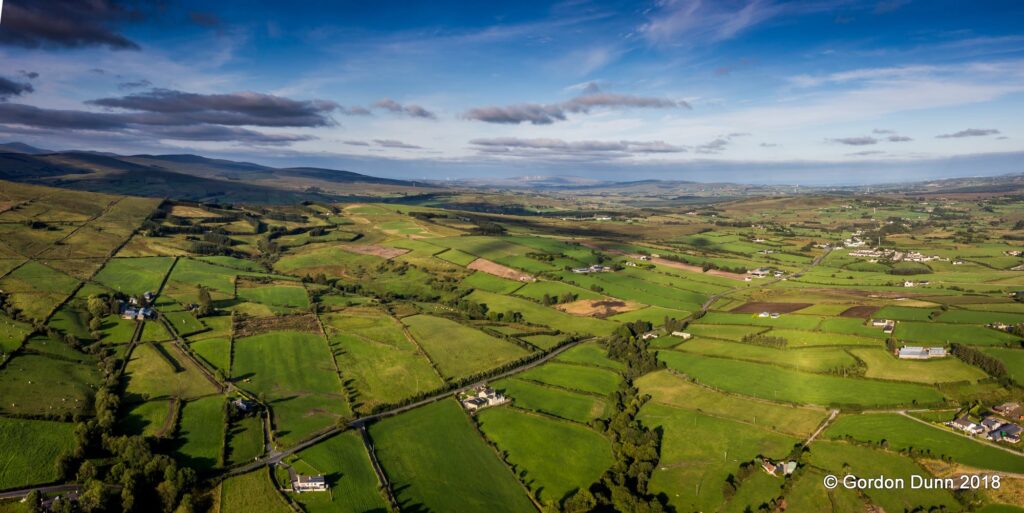Ahead of the Northern Ireland Assembly election on 5th May, Northern Slant wants to give our readers the opportunity to (virtually) meet candidates from across the political spectrum. The one thing they have in common is that none of them have been elected to the Assembly before. In this interview we hear from Susan Glass, the Green Party candidate for West Tyrone.

Hi Susan, could you tell us a bit about yourself and your life before entering politics?
My name is Susan Glass, and I am the Green Party Candidate for West Tyrone. I live in Omagh, and I have worked in the in the community and voluntary sector for over 20 years, managing and coordinating a range of diverse projects locally and across Northern Ireland. These have included capital building projects, a significant regional mental health project, a major cross border cultural and arts project, exhibitions, festivals, and large-scale outdoor events. Outside of politics and work I enjoy abstract photography; I am a committed fan of ABBA and I make amazing cocktails. Most recently I have volunteered with the Omagh Pride Committee and helped them coordinate the first Pride parade in Omagh in September 2021.
What is the main reason you’ve decided to stand in this election and what made you choose to stand for the Green Party?
I have been an active member of the Green Party NI since 2015, managing several election campaigns in West Tyrone, as well as standing for the Local and Westminster Elections in 2019. This is my first Assembly Election as a candidate. From 2017 to 2021 I served as Membership Secretary for the party, and I continue to represent West Tyrone on the Executive Committee.
Through my work I have seen the impacts of crises in education, health, housing, the cost of living and climate on people’s everyday lives at first hand and wants to see radical action and change from Stormont. It is important to me that the electorate in West Tyrone have the opportunity to vote for non-sectarian, progressive politics.
Sometimes election campaigns can be criticised for focusing too much on the short-term. What is your main long-term priority and, if elected, how will you try to address it?
The things that matter in this election are everyday bread and butter issues – the health service and waiting lists, the cost-of-living, education, poor housing, rising energy costs. Unfortunately, they require short-term measures to alleviate these crises right now. There is £300m that could have been spent on extending emergency payments to those most in need, but this was effectively blocked by the DUP when they walked away from government.
The traditional parties have failed our public services, not delivering the long-promised multi-year budget to provide our schools and hospitals with the long-term financial certainty they need. As we begin to emerge from the pandemic, we need to ensure that people and communities are given the investment and resources needed to rebuild and recover. However, the politics of deadlock and division will not address the cost-of-living crisis, the waiting list crisis, and the housing crisis. There is a desperate need for a wide range of emergency policies to address these in the short-term, including direct payments to those most in need.
In the longer-term, we need to tackle our fossil fuel dependency. We want to see publicly owned and community-led renewable energy projects. Investment in renewables will create jobs, reduce emissions, and drive down energy prices in the long-term. We need a fit-for-purpose domestic renewable heat incentive scheme, investment in high-quality green jobs, housing, and public services. We need to build wealth in our communities. Real climate action will create a better and fairer society for all. It’s time for a Green New Deal.
The Greens understand how deep, how radical, and how urgent the changes we need to make are. We need system change, not climate change and there is so much more to do. The Climate Bill is just the start, and nothing can be taken for granted. The legislation needs to be fully implemented and emissions targets met. We have a shameful environmental record, and we remain the highest per capita emitter on these islands. We also need a fully independent Environmental Protection Agency – promised in the last mandate but still not delivered. This will only change with hard work and political bravery.
These are the issues that need our attention, and these are the issues the Green Party NI is committed to delivering on.
If you could introduce a Private Member’s Bill, what would it be?
It is very difficult to think of one Bill when there is so much that needs to be done to tackle the inequalities in our society.
However, in West Tyrone we are facing one of the biggest environmental disasters on our doorstep. I am committed to ensuring that we protect our natural resources and say no to gold mining in The Sperrins. I would cease the granting of prospecting licenses for all types of mineral extraction and, importantly, the Bill would radically overhaul the planning system to ensure that the rights of communities and the environment are given priority over corporate interest and greed.
In November 2017 international mining company, Dalradian Gold Ltd, submitted what is the single largest planning application in Northern Ireland, for what can only be described as a mining development on an industrial scale. At 900 metres deep, removing 1,700 tonnes of rock per day and a 53-meter-high mining waste facility, the local community of Greencastle are facing a David and Goliath battle to prevent this development becoming a reality. The mining industry is one of the most environmentally and socially damaging types of land use and is a major contributor to environmental destruction globally. The economic evidence from around the world also demonstrates that these industries extract wealth from local economies and leave long-term problems with often irreparable damage that has a negative impact economically and environmentally. This includes potential leaching of highly toxic contaminants and heavy metals (such as arsenic and lead) into the rivers and water systems, as well as air pollution caused by toxic dust and emissions from heavy goods vehicles.
However, over the past six years opposition to the development has grown and anti-mining groups have been campaigning across the country, raising awareness of the devasting impact this development could have on the environment. So effective has the campaigning been that there have been an unprecedented number of objections to the planning proposal – 90% of the 41,000 written submissions to date. Environmental activism is thriving, and anti-mining groups are across the country are fighting to protect their communities. From Tyrone to Donegal, Cavan, Louth and Monaghan, the message is clear – keep it in the ground.
Some people might think that it’s not worth voting in this election. What would you say to them?
What is clear on the doorstep is the frustration with how politics in Northern Ireland is being done. People genuinely believe that nothing has changed in the years since the Good Friday Agreement in 1998, and that nothing will change – it will be the same-old, same-old sectarian politics. But if those 35% who don’t vote exercised their democratic right, then things could be radically transformed. They have the power to change the status quo by going out this Thursday and voting for progressive politics.
But we also must understand that our system is broken. For too long the traditional political parties have made the rules to suit their own agenda of division, at our expense. So, we need to listen, and put people back at the heart of decision-making – a citizens’ assembly model of democracy.
Change is possible in Northern Ireland and the Green Party is evidence of that. We have delivered where it matters and punch well above our weight, and more Greens in Stormont means more delivery on the issues that matter.
It is time for a new approach. Vote Green No. 1 on Thursday 5th May.

Voting will be open on Thursday 5th May between 7am and 10pm. You can find the full list of candidates standing in each constituency on the Electoral Office website here. No matter your persuasion, we encourage you to weigh up the options and head to the voting booth on 5th May. Make your voice heard.
Check out the rest of our #MeetTheCandidate series here. Candidates from across the political spectrum, and across Northern Ireland, were invited to take part.
Also published on Medium.
